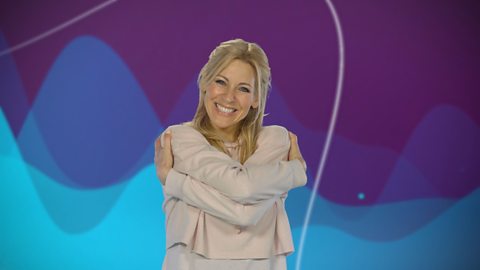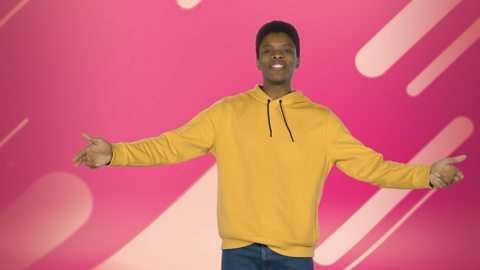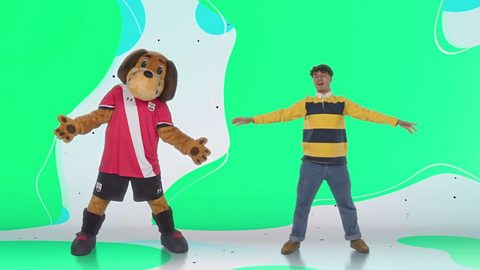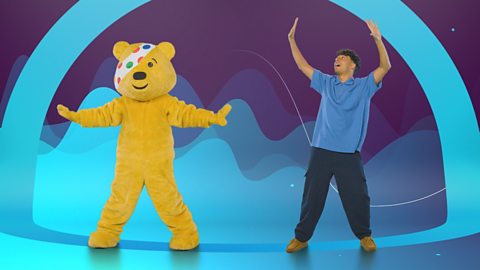Rhys Stephenson:
Hey Super Movers!!
We are all citizens!
But what are citizens and what do we do?
Citizens unite!
We Are Citizens. Weâre all part of our country
Taking part in life and steering our community.
We Are Citizens. Oh yeah that means me and you
Share responsibility and thatâs not all we do.
Citizens of our country!
Together weâre community.
As we grow up, we learn to be
A citizen! thatâs you and me.
Start taking part and giving views.
Vote in elections, yeah! we choose!
Have a say and have a choice.
We are citizens and we have a voice.
Contribute to our country
You could volunteer and give your time for free.
Youâre a citizen, you can do these two.
But thereâs many more things that we can do.
Get a job! And earn money!
Pay some tax. Whatâs that? Youâll seeâŠ
Improving how we do these things
We are citizens let me hear you sing!
Woah. Citizens! Super Movers! Get those hands in the air!
Woah. Woo! Here we go! Here we go!
Citizens Unite!
We Are Citizens. Weâre all part of our country
Taking part in life and steering our community.
We Are Citizens. Oh yeah that means me and you
Share responsibility and thatâs not all we do.
When we do a job. We will get paid.
Earn some money to spend and save.
You can use a bank to save and grow
When will you need it? You never know.
Tax!! Hey hey whatâs that?
When we earn some money, we give some back.
Itâs a share of the money that we bring in
Tax pays for some things so we all win.
Hospitals. We help pay for them.
The fire brigade. We help pay for them.
Swimming pools, Schools and libraries.
If you pay tax, you help pay for these.
How we run this country itâs up to you!
Which prime minister should we choose?
On election day, we give our vote.
Helping decide who steers the boat.
Woah. Citizens! Super Movers! Get those hands in the air!
Woah. Here we go! Here we go!
Citizens Unite!
We Are Citizens. Weâre all part of our country
Taking part in life and steering our community.
We Are Citizens. Oh yeah that me and you
Share responsibility and thatâs not all that we do.
Citizens Unite!
Rhys Stephenson performs this lively Super Mood Movers song about being good citizens.
Remember, Rhysâ dance moves can be adapted to suit all children. Your class don't need to be âon-pointâ, it's about being physically active, learning and having fun.
After viewing, singing and dancing along, your class could try some of these activities to further explore their learning:
Activities
- Class discussion: A citizen is⊠Ask, 'What do you think it means to be a citizen?' Gather the children's responses to the song and their ideas about the lyrics. Pupils might suggest: adult citizens vote to decide our laws or how money should be spent to help us all and that citizenship also includes taking part in the life of our towns, villages, cities or countries, for example by volunteering or getting involved in community organisations such as clubs.
- Are children citizens?: Ask pupils to discuss this question in pairs or groups. Gather their responses and establish that children are citizens too and will get to vote when they are older. Do the children know the voting age? It differs across the UK. Currently it is 16 to vote in elections to the Scottish and Welsh parliaments and 18 to vote in other elections. Ask, 'Why do you think we have voting ages? Why don't children get to vote on who leads us?' Gather the children's responses. Finally, ask: 'What are you looking forward to having a say over when you get a vote?'
- Volunteers: Ask pupils if they know anyone who volunteers (works for free to help others). They might name friends, family members, or people who help at school or run local clubs. Tell the pupils, 'When we grow up there are lots of choices to make. Maybe there's a club or a group that helps out in your neighbourhood? Maybe you'll be a community volunteer, giving time for free to people who need a helping hand. Maybe you'll take a lead.'
- Clubs: Are any pupils members of a club (a sports club for instance)? Invite those who are to give a one minute talk about the club or group they belong to.
- Suggestion box: Ask, 'If you could change one thing about the way our classroom is organised, to make life better for us all, what would it be?' Gather some ideas, e.g. 'Put the reading books in alphabetical order, so it's easier to find the book you want,' or 'Make a rota for sharpening the crayons.' Set up a suggestion box and invite pupils to write their ideas for classroom improvements on slips of paper and post them.
- Suggestion box debate: Once the class has had a few days to contribute to the suggestion box, list the proposals they put forward and ask pupils to work in groups and consider them. Each group could list their top five suggestions and give reasons for their choices to the class.
- Voting: Ask children to vote for their top three proposals. You could do this by a show of hands, or the children could make a ballot box and ballot papers.
- Opinion survey - favourite author: Ask a group of pupils to conduct an opinion survey of the children's favourite authors. They could share the results with the class and you could have a show of hands to decide on the children's favourite author. You could use the vote to choose a new book to read at story time.
- Story leader: Ask, 'If you could choose a character from a story to be our Prime Minister, the leader of our country, who would you choose and why?' Pupils could discuss their ideas in pairs and then feed back their responses to the class. The class could finally vote to find the most popular choice of fictional character to take over as PM.
- Future Me: Begin with, 'When, as adults, we become full citizens, we often have a job of work to do. What job do you think you might like to do?' Children could discuss their ideas with a partner and draw a picture of their 'Future Me' doing this dream job. Encourage children to share their self-portraits with the class and explain their reasons for choosing that job.
- Managing money: Tell the children, 'That Future You is going to need to manage your money! But do you know how many different coins and notes we have and the pictures that are on them?' Challenge pupils to name, draw or describe all our different coins and notes. They could make wax rubbings of the different coin designs.
- Schoolroom shop: Ask the children to set up a 'schoolroom shop', using empty-but-clean cartons, boxes, bottles and packaging of groceries and other products. They could take turns to play the roles of shop-keeper and customer and use counters for coins or slips of paper for notes. Challenge the customers to buy the ingredients for a family dinner for less than ÂŁ5. And challenge the shop keeper to work out the correct change to give.
- Banks and interest: Ask, 'What is a bank and how does it work?' Guide the pupils' responses to establish that people put money into bank accounts to keep it safe and to make it more convenient to spend using a plastic card, for instance when shopping online. If people use a savings account, the bank pays an extra amount of money on top of what was saved. Give some simple examples of amounts of money and annual interest rates and ask the children to work out how much they would end up with.
- Borrowing from banks: Tell pupils, 'People who are over the age of 18 can borrow money from banks. But if the bank agrees to lend someone money, it expects them to pay interest on what they borrow. So if you borrow money from a bank, you end up paying back more than you borrowed.' Again, give the children some examples of amounts borrowed and annual interest rates and ask the pupils to work out how much would have to be paid back.
- Taxes: Ask, 'What is tax?' Gather the children's responses and establish that 'tax' is money paid to the government, which it uses to fund the public services we all use at one time or another. Grown-ups pay taxes on the money they earn from work, but there are other taxes too: drivers pay a tax to use the road and households pay a community charge to the local council. Even children pay tax. 'Value Added Tax' or VAT is paid on chocolates, sweets and fizzy drinks. Give the class this figure: 20% of the price of a bar of chocolate or a fizzy drink is VAT. Ask pupils to work out the cost of various bars of chocolate or fizzy drinks minus the tax paid.
- What do we spend our taxes on?: Ask pupils to draw things that we spend our taxes on. They might draw: hospitals, schools, libraries, swimming pools, parks, street lights and recycling lorries. Encourage them to draw people too: nurses, doctors, fire-fighters, soldiers, park rangers, teachers and police officers, for instance. Establish that, 'From the money we make, we all give a share back to our country, to look after everybody. And we call that money tax.'
Please note: Itâs important to recognise and be sensitive to the fact that some children may be living with parents who donât or canât work or are receiving supporting income.
Learning aims or objectives
The Super Mood Movers song We' Are Citizens and these activity notes address the following learning objectives from the curriculum guidance of the four UK nations.
England, PHSE and RSE
From the PSHE Association programme of study:
- H16. being involved in community groups, doing things for others.
- H35. about the new opportunities and responsibilities that increasing independence may bring.
- L1. to recognise reasons for rules and laws.
- L5. ways of carrying out shared responsibilities.
- L7. to value the different contributions that people and groups make to the community.
- L17. about the different ways to pay for things and the choices people have about this.
- L18. what influences peopleâs decisions.
- L26. that there is a broad range of different jobs/careers that people can have.
- L29. that people may choose to do voluntary work which is unpaid
From the RSE guidance:
- Respectful relationships: the importance of respecting others, even when they are very different (for example, physically, in character, personality or backgrounds), or make different choices or have different preferences or beliefs; practical steps to take in a range of different contexts to improve or support respectful relationships.
- The conventions of courtesy and manners: that in school and in wider society they can expect to be treated with respect by others, and that in turn they should show due respect to others, including those in positions of authority.
Northern Ireland, PD&MU
From the Northern Ireland curriculum for Personal Development and Mutual Understanding:
- (Strand 2) Theme 1: Self-awareness:
- Develop self-awareness, self-respect and self-esteem.
- Know how to confidently express their own views and opinions in unfamiliar circumstances.
- How responsibilities change as we become older and more independent.
- Theme 6: Rules, Rights and Responsibilities:
- Human rights and social responsibility.
- Identify the variety of groups that exist within the community and their the roles and responsibilities.
- Consider the rights and responsibilities of members of the community.
- Theme 9: Learning to Live As Members of the Community:
- Playing an active and meaningful part in the life of the community.
- The importance of democratic decision-making and active participation at home and in the classroom.
- Appreciate the interdependence of people within the community.
- Know about the importance of democratic decision-making and involvement and the institutions that support it at a local level.
- Develop an understanding of their role and responsibility as consumers in society.
- Know about the range of jobs and work carried out by different people.
Scotland, PSE
From the Education Scotland Personal and Social Education benchmarks:
- Planning for choices and changes: I can describe some of the kinds of work that people do and I am finding out about the wider world of work, (HWB 1-20a).
- I am investigating different careers / occupations, ways of working, and learning and training paths. I am gaining experience that helps me recognise the relevance of my learning, skills and interests to my future life, (HWB 2-20a).
From the Curriculum for Excellence Health and Wellbeing Experiences and Outcomes:
- Social Wellbeing: As I explore the rights to which I and others are entitled, I am able to exercise these rights appropriately and accept the responsibilities that go with them. I show respect for the rights of others, (HWB 1-09a / HWB 2-09a).
- Representing my class, school and/or wider community encourages my self-worth and confidence and allows me to contribute to and participate in society (HWB 1-12a / HWB 2-12a).
- Through contributing my views, time and talents, I play a part in bringing about positive change in my school and wider community (HWB 1-13a / HWB 2-13a).
Wales, PSE
From the Personal and Social Education Framework for 7 to 19-year-olds in Wales:
- Active citizenship: value diversity and recognise the importance of equality of opportunity. To understand: the importance of democratic decision-making.
- Moral and spiritual development: explore their personal values; be honest and fair and have respect for rules, the law and authority.
- To understand: how cultural values and religious beliefs shape the way people live: that people differ in what they believe is right and wrong.
- Preparing for lifelong learning: the range of jobs carried out by people in their community; that money is earned through work and can buy goods and services; the importance of looking after their money and the benefits of regular saving.
- Sustainable development and global citizenship: to take an active interest in varied aspects of life in school and the wider environment; to develop a positive attitude on issues of poverty and fairness and to understand how the environment can be affected by the decisions we make individually and collectively.

More from Super Mood Movers:
Wellbeing. video
Naomi Wilkinson performs this comforting Super Mood Movers song about taking care of our mental wellbeing.

Rights and respect. video
Rhys Stephenson performs this stirring Super Mood Movers song about respecting ourselves and others.

Change is life. video
Karim Zeroual and Southampton mascot Sammy Saint perform this heartening Super Mood Movers song about how change is a part of life.

Look after yourself. video
Pudsey and Karim Zeroual perform this catchy Super Mood Movers song about looking after yourself and taking on new challenges.

Giving something back. video
Sammy Saint and Billy Badger perform this memorable Super Mood Movers song about coming together and giving something back.
